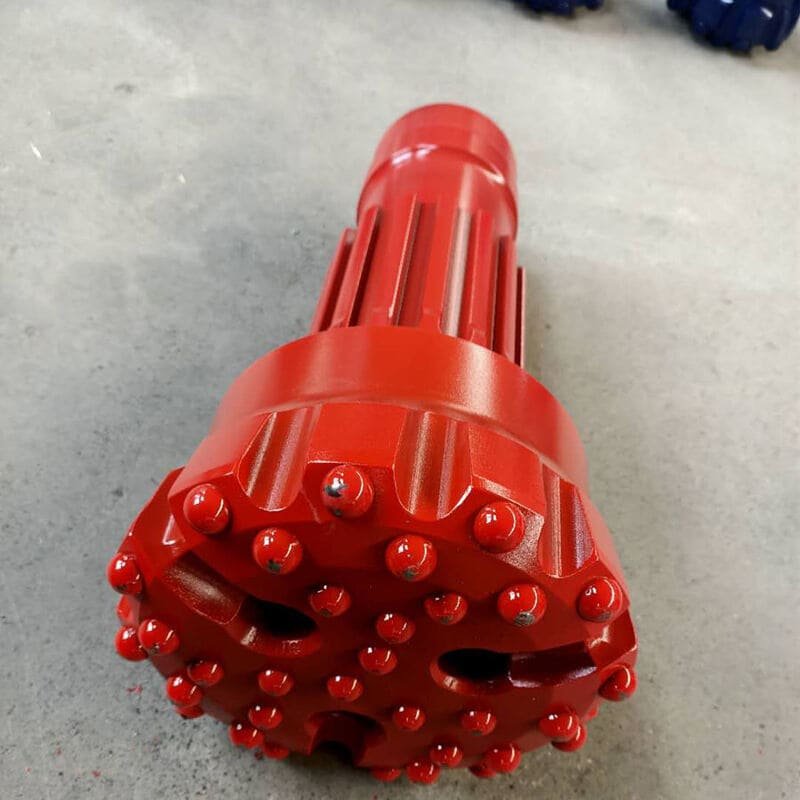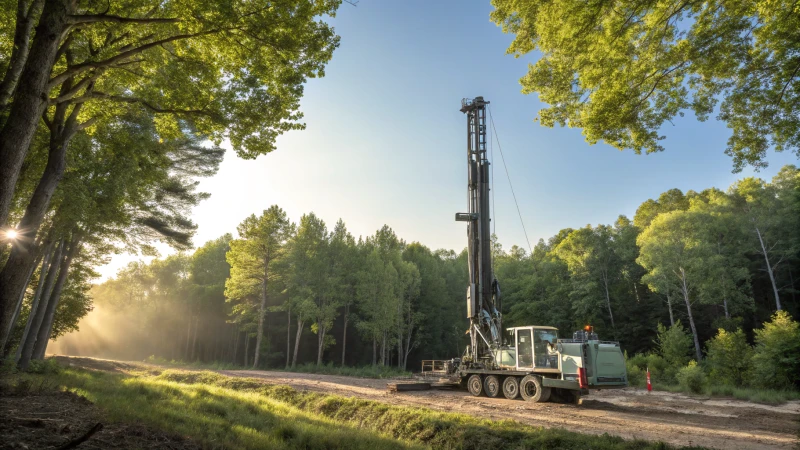
Have you ever thought about how drilling might hurt our planet less?
Down-the-hole (DTH) drilling helps the environment by minimizing landscape disruption. It lowers waste, energy consumption and noise. This drilling method offers precise and efficient solutions. It is a sustainable option compared to older techniques. DTH drilling reduces carbon emissions. It decreases harmful effects on the environment.
I remember the first time I learned about DTH drilling's environmental benefits. It was a light bulb moment. Drilling, which seems intrusive, could actually be gentle on the Earth. This was eye-opening. Beyond immediate benefits like less noise and reduced waste, the long-term impacts are profound. Imagine a world where people extract resources without leaving scars on the landscape. Innovations in DTH drilling are leading the way toward a greener future. Fuel consumption decreases with this method. There is also less chemical use involved. This is important. This method is truly a game-changer for both the industry and our environment.
DTH drilling reduces landscape disruption.True
DTH drilling requires less surface area, minimizing environmental impact.
DTH drilling increases carbon emissions.False
DTH drilling is designed to lower carbon emissions through efficiency.
How Does DTH Drilling Offer a Greener Alternative to Traditional Methods?
Do you ever think about drilling being kinder to the Earth? DTH drilling probably offers a solution.
DTH drilling is kinder to the environment than traditional methods. It provides exact targeting and decreases waste. This method uses less energy. It operates quietly. It is an excellent choice for reducing harm to nature. Efficient resource extraction is still possible. This choice minimizes ecological impact.
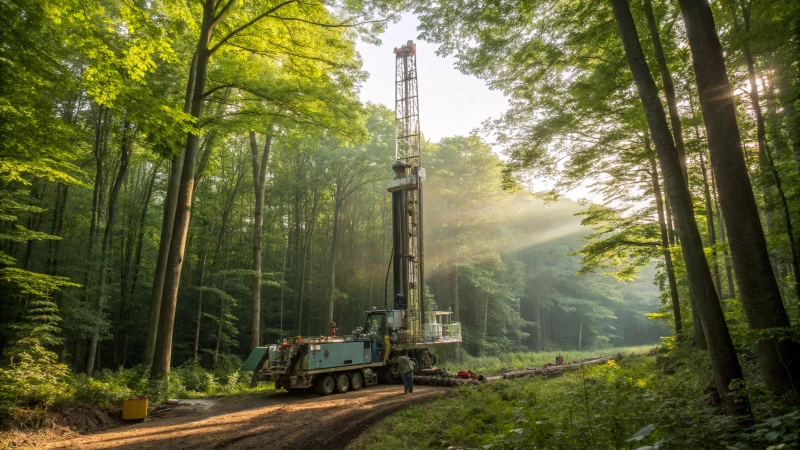
Precision and Minimal Environmental Disturbance
Picture yourself in a big, open wilderness filled with nature's beauty. You know there's a lot of valuable minerals beneath your feet. Instead of damaging the land to find them, you have a special tool. This tool lets you reach exactly what you need without causing harm. That's the wonder of DTH drilling. It focuses on specific minerals accurately, leaving a small environmental footprint. This method protects nature more effectively than older techniques. DTH drilling is very precise and minimizes damage.
DTH drilling offers unparalleled precision in its operations. This technique allows for targeting specific mineral deposits with minimal excavation, significantly reducing the impact on surrounding ecosystems1. Unlike traditional methods that can disrupt large areas, DTH's focused approach ensures that only necessary areas are affected.
Energy Efficiency and Reduced Emissions
Imagine morning dew as drilling rigs start with traditional methods. They burn a lot of fuel, creating emissions. Yet, with DTH drilling, energy use is really efficient—like watching a perfect orchestra. The energy goes straight from hammer to bit, reducing fuel use and pollution.
I've seen up to 30% less fuel needed compared to rotary drilling—great for the planet; better for my budget.
A key advantage of DTH drilling is its efficient energy use. The direct transfer of energy from the hammer to the bit minimizes energy loss. This efficient energy conversion leads to lower fuel consumption—sometimes reducing usage by up to 30% compared to rotary drilling techniques2. Consequently, this reduction in energy demand decreases greenhouse gas emissions and operational costs.
| Traditional Methods | DTH Drilling |
|---|---|
| High fuel consumption | Lower fuel usage |
| Greater emissions | Reduced emissions |
Noise Reduction and Community Impact
I remember working near a busy city where noise complaints were frequent. Traditional drilling was like a loud rock concert next to a quiet library. With DTH drilling, noise was more like a gentle hum—it created less sound and vibration.
The community found it less disruptive and local wildlife stayed peaceful.
DTH drilling generates less noise and vibration compared to many conventional methods. This quieter operation is particularly advantageous in urban or wildlife-sensitive areas where noise pollution3 can be a concern. By minimizing disturbances, DTH drilling supports both community well-being and wildlife conservation efforts.
Longevity of Equipment and Sustainability
Throughout my experience with DTH systems, they last long and perform well—the equipment’s durability means fewer replacements and less new manufacturing.
This extends sustainability by saving resources and reducing waste.
Every DTH choice supports longevity and sustainability; it's comforting to choose long-lasting equipment.
The design of DTH systems inherently reduces wear and tear on equipment. This longevity means fewer replacements and a decrease in the manufacturing of new parts, leading to a reduction in resource consumption. The durable nature of DTH components ensures a longer lifespan, contributing to more sustainable operation4.
Adaptability Across Various Conditions
DTH drilling is like a Swiss Army knife in my toolbox—it adapts easily to various conditions, from hard rocks to soft soil. Its versatility in handling a wide range of geological conditions minimizes the need for multiple drilling systems, simplifying the work site and optimizing resource use. This adaptability not only enhances operational efficiency across projects but also reduces the environmental burden of drilling operations5. It's about working smarter, not harder—and definitely greener.
DTH drilling reduces fuel consumption by up to 30%.True
DTH drilling's energy efficiency leads to significant fuel savings.
Traditional drilling methods generate less noise than DTH.False
DTH drilling is quieter, making it better for sensitive areas.
How Does Precision in DTH Drilling Reduce Landscape Disruption?
Have you ever thought about how drilling might be exact and kind to the earth? DTH drilling achieves this. It reshapes the land both literally and figuratively. This process avoids big disruptions.
Precision in Down-The-Hole (DTH) drilling targets mineral deposits accurately. This method reduces landscape disruption. It minimizes unnecessary excavation, thus limiting damage to the environment. Efficient resource use becomes a reality with this technique. It generates less waste. The reduced environmental impact really matters.
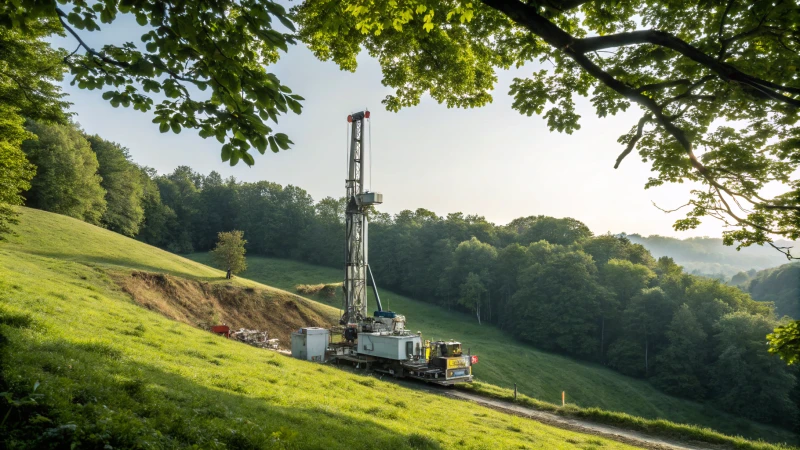
The Role of Precision in DTH Drilling
I remember standing on a construction site, amazed by the power of the machines around me. Yet, I felt uneasy about the harm they could probably cause to the environment. Precision in DTH drilling technology6 really changes this. This method targets mineral deposits with great accuracy, causing minimal harm to nature.
Targeting Mineral Deposits
Imagine picking apples from a tree. Instead of shaking the tree and causing a mess, you would probably want to choose only the ripe apples. This is what DTH drilling does with mineral deposits. It focuses on specific spots, so we don’t have to dig up large areas. This precision protects local ecosystems and leaves more nature untouched. When mining minerals in rock, we remove less surrounding material with this method.
| Benefits of Precision | Description |
|---|---|
| Reduced Waste | Produces less waste material during drilling, conserving resources. |
| Efficient Resource Use | Utilizes fewer resources by targeting only necessary areas. |
Reduced Environmental Footprint
I once went to a site where waste management really caused problems. Precise DTH drilling leads to much less waste. Drill bits are very efficient and only drill what’s needed, causing less material to move and less waste to manage. This precision is really important for areas where protecting the natural landscape matters a lot.
Moreover, precise force usage helps save energy. DTH systems7 send energy directly to the drill bit, cutting energy loss and increasing efficiency. Traditional rotary drilling uses more energy and disturbs the landscape more.
Technological Innovations Driving Precision
I remember reading about advanced drill bit technology and it was amazing. Modern DTH bits work well in different geological conditions, offering flexibility and accuracy. This ability reduces the need for many drilling systems on-site, which really helps in saving resources and protecting the environment.
| Innovations | Impact on Precision |
|---|---|
| Smart Sensors | Allow real-time adjustments during drilling for better accuracy. |
| Advanced Materials | Extend equipment lifespan and maintain precision under harsh conditions. |
Energy Efficiency and Noise Reduction
Precision in DTH drilling saves energy, which cuts costs and lowers carbon emissions. Precise force from the hammer to the bit reduces wasted energy.
Furthermore, precise drilling also creates less noise and vibration. I worked near urban areas where quiet was vital; DTH drilling8 suits such jobs perfectly as it’s very suitable for operations near cities or in quiet zones.
Precision in DTH drilling is not just about finishing tasks correctly; it respects our planet’s balance. It’s a sustainable solution fit for today’s challenges—industries achieve their aims while caring for our natural landscapes.
DTH drilling reduces waste by targeting specific areas.True
Precision in DTH drilling focuses on necessary areas, minimizing waste.
Traditional drilling is more precise than DTH drilling.False
DTH drilling offers greater precision than traditional methods, reducing disruption.
How Does DTH Drilling Help Reduce Energy Consumption?
Ever thought about how drilling could be both strong and kind to the environment?
DTH drilling uses energy efficiently. It transfers energy from the hammer to the drill bit very well. This reduces energy losses. Fuel use decreases. Operational costs drop significantly. Environmental impact becomes lower. Using DTH drilling is a very effective approach.
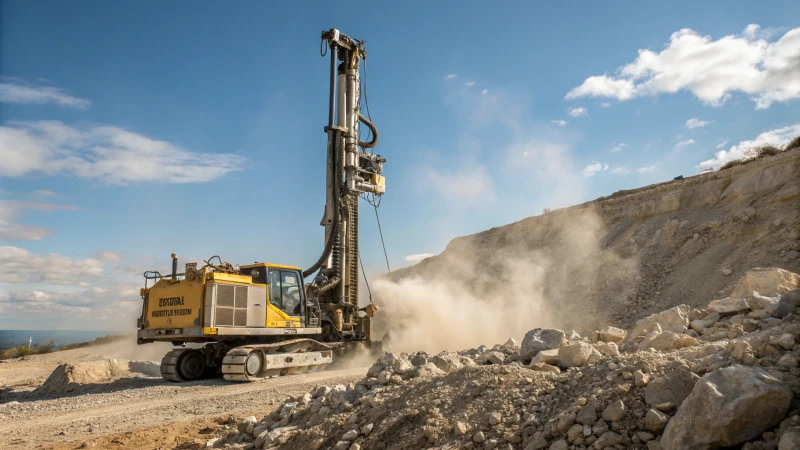
Direct Energy Transfer Mechanism
Picture a drill that creates a hole with great accuracy and strength while using less energy. That's what DTH drilling does! The hammer is right behind the drill bit, directing energy straight to where it's necessary. This avoids energy loss through the drill string. Think of it as talking directly, without misunderstandings. This technique penetrates faster and needs less energy than older methods. Really efficient.
Fuel Efficiency Benefits
Remember the first time seeing a DTH rig working? It was like observing a smooth machine in action. These rigs use energy efficiently, saving a lot of fuel. Some studies9 found up to 30% less fuel is needed. Large operations reduce costs and save millions of diesel liters every year. This benefits the budget and helps the environment. It’s huge.
Equipment Longevity and Reduced Maintenance
DTH systems impressed me by reducing vibration and stress on machines. This result is longer equipment life. Fewer drill bits and rods need changing. Manufacturing and shipping new parts consume less energy when replacements are rare. Reliable machines mean fewer repairs.
| Aspect | Traditional Drilling | DTH Drilling |
|---|---|---|
| Energy Transfer | Indirect via drill string | Direct from hammer |
| Fuel Use | Higher | Up to 30% less |
| Equipment Wear | Higher | Reduced |
Adaptability Across Conditions
DTH drilling shows amazing flexibility across different geological conditions without needing extra systems. This adaptability improves resource use and lowers energy needs, aligning with environmental goals by using fewer chemicals in drilling fluids.
Noise Reduction Advantages10
A favorite DTH feature is its quiet operation, which favors areas sensitive to noise and lowers energy use for noise control measures. Smoother operations come with less noise and vibration, making additional soundproofing unnecessary in urban settings.
DTH drilling reduces fuel consumption by up to 30%.True
Studies indicate DTH systems' design leads to significant fuel savings.
Traditional drilling methods have lower equipment wear than DTH.False
DTH systems minimize vibration, reducing mechanical stress and wear.
Why is noise reduction important in DTH drilling operations?
Have you ever woken up suddenly because of the loud noise from drilling? I have. It's not just annoying. It's a real problem in DTH drilling work.
Reducing noise in DTH drilling is important. It protects worker health. It follows rules set by authorities. Noise reduction also lowers harm to the environment. Fewer disturbances improve how operations run. Good relations with the community are very important.
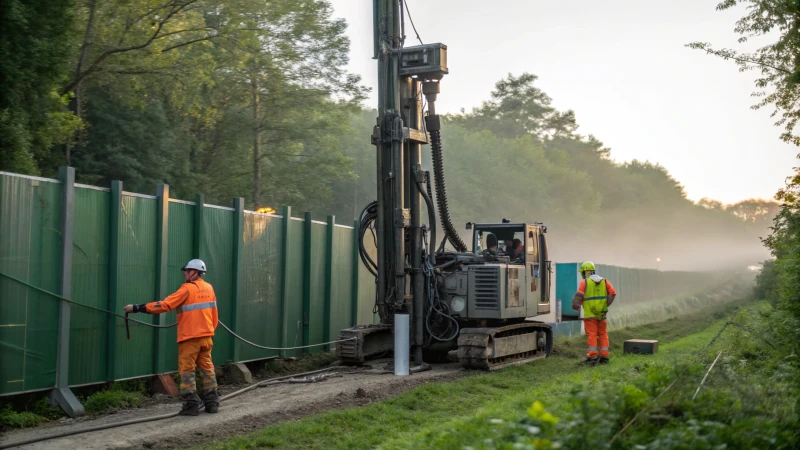
Worker Safety and Health
Working next to DTH drilling is very loud, like standing by a jet engine. The noise harms hearing and adds stress, draining energy and focus. Noise reduction matters because it shows care for workers. Proper hearing protection and quieter tools help a lot. It can change a tough day into a manageable one.
Implementing effective noise reduction strategies can protect workers' health11 and improve workplace safety.
Environmental Impact
Living near drilling sites, I notice noise affects daily life. Not only people suffer; wildlife runs away. Noise annoys the community too. Reducing noise helps the environment and keeps peace with neighbors. This is really important near homes and nature reserves.
| Impact | Description |
|---|---|
| Wildlife | Noise can cause stress and disrupt natural behaviors |
| Community | Continuous noise affects daily life |
Compliance with Regulations
Following rules feels difficult, but it's important for sustainable operations. Compliance protects against heavy fines and legal problems. Using sound barriers and noise-dampening technology preserves reputation and financial stability.
Many regions have strict noise level regulations for industrial activities. DTH drilling operations must adhere to these standards to avoid fines and legal issues, ensuring they meet compliance requirements12.
Enhanced Operational Efficiency
Quiet operations are possible. Lower noise means clearer conversations. Clear communication leads to fewer mistakes and smoother workflow. This increases productivity and reduces downtime.
Reducing noise not only protects the environment but also enhances operational efficiency by facilitating better communication among workers, leading to fewer errors.
Community Relations
Being a good neighbor involves more than just friendliness; it requires tangible actions. Reducing noise levels in DTH drilling not only demonstrates care for those nearby but also helps build stronger community ties. This fosters local support and collaboration, which are essential for successful operations. Community engagement13 is crucial for sustaining long-term operations in any region.
Noise reduction is not merely a requirement—it's a wise decision in DTH drilling that enhances safety, efficiency, and goodwill.
Noise reduction in DTH drilling protects workers' health.True
Reducing noise prevents hearing loss and stress, enhancing safety.
DTH drilling noise doesn't affect community relations.False
High noise levels can disturb communities, harming relations.
How Does the Longevity of DTH Equipment Reduce Environmental Impact?
Have you ever thought about how drilling equipment possibly acts as an unexpected friend in helping the planet survive?
DTH drilling equipment lasts a long time. This long lifespan reduces waste from frequent replacements. Fewer replacements mean resources are saved. Energy use related to producing new parts decreases. This conservation helps the environment.
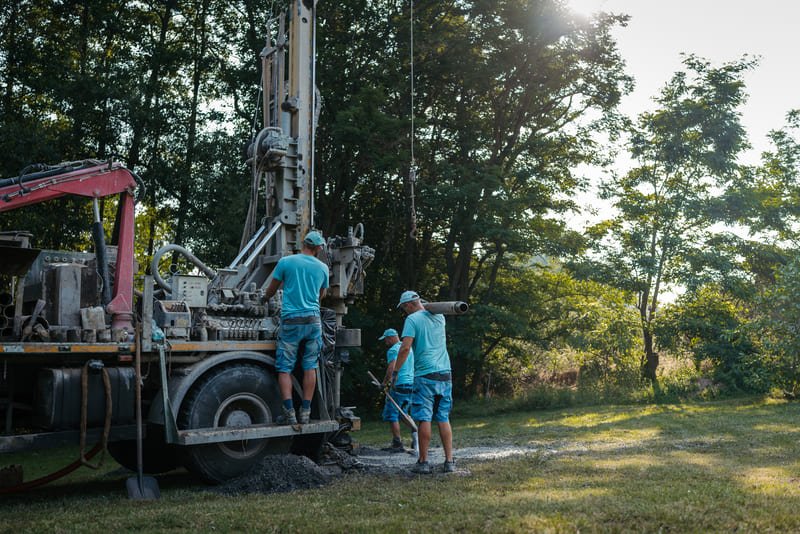
Extending Equipment Lifespan
Think about a reliable old tool that never seems to quit. That's how DTH equipment feels - designed for durability. Imagine a car that stays smooth even over rough roads. Its design reduces vibrations, leading to less damage. This strength means fewer replacements and less impact on Earth’s resources. I've observed how this approach conserves materials and lowers the manufacturing footprint14.
Resource Conservation
Picture this: every time a DTH drill bit lasts longer, it's as if we cut the need for new materials like steel and tungsten carbide in half. It reminds me of how my grandmother reused everything in her garden, saving resources and matching sustainable mining practices15. A small change creates a big impact.
| Component | Average Lifespan | Environmental Benefit |
|---|---|---|
| Drill Bits | 2x industry standard | Reduced material waste |
| Hammers | 1.5x industry standard | Lower energy consumption |
Energy Efficiency
When we prolong equipment life, it's like choosing to walk over driving - saving energy and cutting emissions. Longer-lasting DTH gear consumes less energy for production and transport. Imagine reducing extra trips, leading to fewer emissions from logistics operations16 and a smaller carbon footprint.
Waste Reduction
Have you ever felt bad about throwing something away too soon? Opting for durable DTH solutions resembles choosing reusable bags over single-use plastics - less waste, more sustainability. By needing fewer replacements, we generate less waste, keeping landfills less filled and the recycling process less energy-demanding.
Economic and Environmental Symbiosis
Investing in sturdy equipment is like buying quality shoes. They might cost more initially but save money over time. Companies experience lower operation costs and better investment returns with efficient procurement strategies17. This results in both economic success and environmental protection.
DTH equipment design reduces wear and tear.True
Precise engineering minimizes vibrations, extending lifespan.
Longer-lasting DTH bits double steel use.False
Extended lifespan halves steel need, conserving resources.
How Does DTH Drilling Protect the Environment?
Learn how DTH drilling goes beyond efficiency and helps the Earth. Explore its eco-friendly method that lowers chemical use and supports local ecosystems. This approach really works to protect our planet.
DTH (Down-The-Hole) drilling uses fewer chemicals. This method reduces the need for many additives in drilling fluids. It protects local water sources from contamination. DTH drilling is very precise. Precision minimizes environmental disturbance. This approach helps to preserve ecosystems.
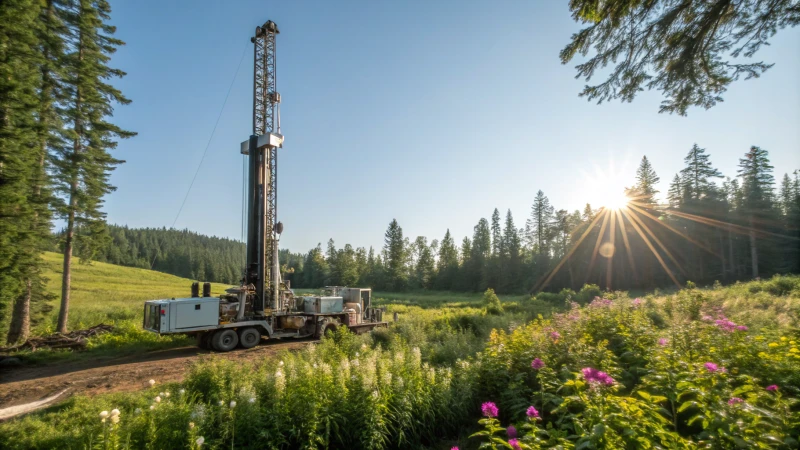
Understanding DTH Drilling's Environmental Impact
DTH drilling, known for its precision, directly addresses environmental challenges by targeting mineral deposits accurately. This method avoids careless excavation and preserves the surrounding landscape, maintaining its beauty and balance. The reduction in waste generation benefits the environment and simplifies resource management.
| Aspect | Traditional Drilling | DTH Drilling |
|---|---|---|
| Chemical Use | High | Low |
| Environmental Disturbance | Significant | Minimal |
| Waste Generation | High | Low |
Reduced Chemical Dependency
I remember visiting a site using traditional drilling methods where the number of chemicals used was significant. In contrast, DTH drilling felt like fresh air as it requires fewer chemical additives18. This results in cleaner water and decreases the risk of chemical contamination, benefiting both industry and nature.
Energy Efficiency and Ecosystem Protection
Energy efficiency has always been my passion, and DTH systems excel in saving fuel by transferring energy directly to the drill bit. This reduces fuel consumption and emissions, thereby lowering greenhouse gases19 and noise pollution. Such reductions are crucial near wildlife habitats or urban areas.
Traditional drilling often sounds like a roaring noise, but DTH drilling operates quietly. This quieter method is less disruptive to wildlife and communities.
Application Across Diverse Conditions
DTH drilling handles different geological conditions with ease across various projects. Fewer systems are needed on-site, optimizing resources which is important for maintaining ecological balance20 while achieving industrial goals.
Moreover, DTH equipment lasts longer, resulting in fewer replacements that save manufacturing resources. By minimizing mechanical stress and wear on components, this approach supports sustainable use of materials and energy.
Through these features, DTH drilling not only aligns with industrial demands but also supports ecological conservation efforts—a wonderful mix of technology and environmental care.
DTH drilling uses fewer chemicals than traditional methods.True
DTH drilling minimizes chemical use by requiring fewer additives, reducing environmental impact.
Traditional drilling is quieter than DTH drilling.False
DTH drilling operates more quietly, minimizing noise pollution and protecting wildlife habitats.
Conclusion
DTH drilling minimizes environmental impact through precise operations, reduced waste and energy consumption, lower emissions, quieter processes, and longer-lasting equipment, promoting sustainable resource extraction.
-
Explore how DTH drilling's precision minimizes ecological disturbances by targeting specific areas. ↩
-
Understand how DTH drilling reduces energy consumption and emissions compared to rotary techniques. ↩
-
Learn about DTH's quieter operation benefits for communities and wildlife. ↩
-
Discover how durable DTH equipment contributes to sustainability by reducing replacements. ↩
-
Investigate how DTH's adaptability across rock types enhances resource efficiency. ↩
-
This link provides a detailed overview of DTH drilling technology, helping you understand its fundamentals and applications. ↩
-
Discover the latest innovations in drill bit technology that enhance precision and efficiency. ↩
-
Learn about how precision technologies are shaping sustainable practices in the drilling industry. ↩
-
Explore detailed studies highlighting the fuel efficiency benefits of using DTH drilling technology in various applications. ↩
-
Discover how DTH drilling technology minimizes noise pollution, benefiting urban and environmentally sensitive projects. ↩
-
Explore how noise impacts health to understand the importance of noise reduction in protecting workers. ↩
-
Learn about compliance standards to avoid fines and improve operational practices. ↩
-
Discover strategies to enhance community relations by addressing noise concerns effectively. ↩
-
Learn how minimizing vibrations in DTH drilling reduces mechanical wear and prolongs equipment life. ↩
-
Explore various sustainable mining practices that help conserve natural resources and minimize environmental impact. ↩
-
Understand the carbon emissions associated with logistics operations and ways to reduce them. ↩
-
Discover procurement strategies that enhance efficiency and reduce costs in drilling operations. ↩
-
Learn about the common chemical additives in traditional drilling and their environmental impact. ↩
-
Discover how energy efficiency in DTH drilling contributes to lower emissions. ↩
-
Explore how DTH's adaptability helps protect ecosystems during drilling operations. ↩



